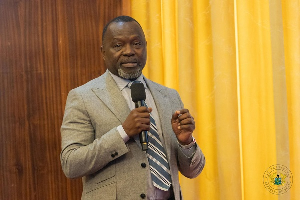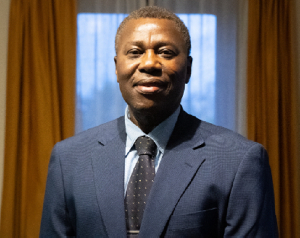I have been observing proceedings with keen interest since the announcement of the deal between the Ghana government and Vodafon UK. The deal is for the Ghana government to sell 70% stake in Ghana telecom to Vodafon. Many reasons have been cited for the sale of GT. Not only GT that is supposed to be sold but what they called “expanded Ghana telecom” which includes the GT fixed lines, One Touch mobile, the national fibre optic project as well as that of the VRA. All these assets are for just $900million. The Irony is while Vodafon is taking up all these assets, they are not taking any debt along with them (GT owes $400million). People have advanced so many arguments for and against the sale of GT.
As an economist, I believe in the private sector being the engine of growth of the economy . My idea is that the government should create the necessary enabling environments for the private sector to function. To a very large extent the government has created a lot of avenues for the private sector to flourish. However, I do not think selling the expanded GT package to Vodafon is the best for the country.
Well as an economist and a public policy analyst, I think it is my duty to make my points clear as to why I oppose the sale of GT and all that come with it.
First of all, the government is saying GT is not efficient and not viable that is why it is being sold. My question is how come GT which enjoys almost monopoly in fixed lines in Ghana is not efficient? Do we have business minded people at the helm of affairs or some politicians doing their own thing? I bet you, if the politicians give way for people with the know -how and the skills to manage GT, they will do well and we will see how viable GT is. Already, no one can really tell me that there is any network in Ghana that is more efficient than One Touch in terms of calls going through and networks being busy. There are some privately owned networks that tell you the person you are calling is out of coverage area when the person is right by your side and the phone is on.
Secondly, I read that the government asked Vodafon to get GT listed on the stock market as soon as possible. What prevents the government from doing same to raise the much needed money from the Ghanaian public?
Thirdly, GT is a strategic national asset. Virtually, Ghana has sold almost all the strategic assets that we have as a country. We all know that GT as a national company has monopoly in so many areas including the National fibre optic. So if all these assets are virtually, gifted to Vodafon, we will have a situation where a foreign private company will be having monopoly over very vital areas of the economy to the disadvantage of their competitors.
Furthermore, I am always in favour of the private sector taking the leading role in the economy that is why I am happy for the new mobile network (ZAIN) that will commence operations very soon. They are adding to the existing networks and will bring healthy competition. If Vodafon are that good as they want us to believe then let them come in with their own brand and add to the competition. The government should not create this undue advantage for them. Why do we always rate the Ghanaian so low when there are Ghanaians doing exploits elsewhere? Let us give capable Ghanaians the chance to perform instead of keeping people who have no idea about the field in which they are, simply because of their political affiliations or their connections with the people at the top. If we claim to believe in Ghana, then we should also believe in Ghanaians, or else one day we will say we cannot manage the economy (Ghana) so some people or countries should come and take over the affairs of the economy.
I maintain that GT should not be sold; rather, it should be given to capable Ghanaian hands to turn it around.
By Gordon Newlove Asamoah
(Lecturer and Public Policy Analyst)
KNUST School of Business, Kumasi.
Opinions of Thursday, 24 July 2008
Columnist: Asamoah, Gordon Newlove














